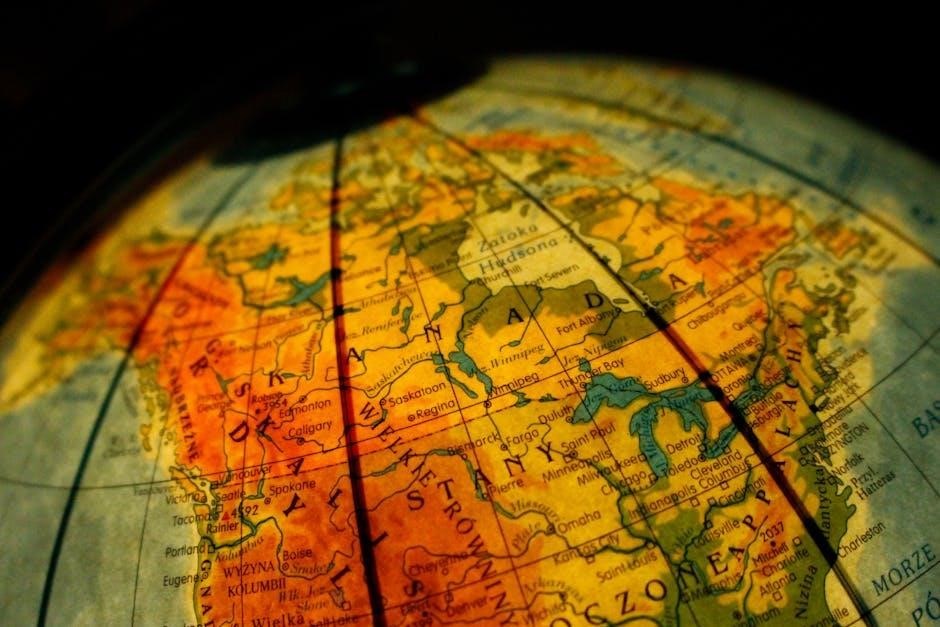a history of the world in six glasses pdf
Exploring humanity’s journey through six iconic beverages, A History of the World in Six Glasses offers a unique perspective on civilization’s development and cultural transformation.
Overview of “A History of the World in Six Glasses”
A History of the World in Six Glasses by Tom Standage explores human civilization through the lens of six beverages: beer, wine, spirits, coffee, tea, and cola. Each drink represents a distinct era, shaping cultural, social, and economic developments. Standage reveals how these beverages influenced major historical events, offering a fresh perspective on global history and its transformations.
The Significance of Beverages in Shaping Human History
Beverages have played a pivotal role in shaping human history, influencing culture, economy, and society. From beer in ancient Mesopotamia to cola in modern times, drinks have driven technological advancements, fostered trade, and sparked revolutions. They served as currencies, symbols of power, and catalysts for cultural exchange, revealing how deeply intertwined beverages are with the progression of human civilization and identity.
The Concept of Six Glasses
The six glasses symbolize pivotal eras, each drink embodying cultural shifts and historical milestones, collectively illustrating humanity’s journey through time.
The Six Beverages: Beer, Wine, Spirits, Coffee, Tea, and Cola
Beer, wine, spirits, coffee, tea, and cola represent six drinks that have shaped human history. From beer’s origins in the Fertile Crescent to cola’s rise in modern globalization, each beverage symbolizes cultural shifts and technological advancements, reflecting the evolution of societies and their values over time.
Historical Eras Represented by Each Beverage
Each beverage symbolizes a distinct historical era: beer for ancient civilizations, wine for classical antiquity, spirits for exploration, coffee for Enlightenment, tea for imperialism, and cola for globalization. Together, they trace humanity’s progress, reflecting technological, cultural, and societal changes that defined their respective periods and shaped the modern world.

Beer and the Dawn of Civilization
Beer emerged in the Fertile Crescent, becoming integral to Mesopotamia and Egypt, used for wages, in rituals, and fostering early societal structures.
Origins of Beer in the Fertile Crescent
Beer first emerged in the Fertile Crescent around 3000 B.C.E., playing a vital role in Mesopotamia and Egypt. It was used for wages, religious rituals, and cultural practices, even featuring in the Epic of Gilgamesh. This drink not only quenched thirst but also facilitated trade and social bonding, becoming a cornerstone of early civilization and agricultural communities.
Beer’s Role in Mesopotamia and Ancient Egypt
Beer held significant cultural and religious importance in Mesopotamia and Ancient Egypt. It was used to pay wages, featured in the Epic of Gilgamesh, and played a role in religious rituals. Beer also facilitated trade and social bonding, becoming a cornerstone of early civilization and agricultural communities. Its influence extended beyond mere consumption, shaping societal structures and daily life, impacting labor practices and governance, making it a vital component of their economies and enduring traditions.
Wine and the Ancient World
Wine played a central role in Ancient Greece and Rome, shaping culture, trade, and empire-building. It was a symbol of wealth, religion, and intellectual exchange, influencing societal norms and economic systems across the Mediterranean.
Wine in Ancient Greece and Rome
Wine was a cornerstone of Ancient Greek and Roman culture, serving as a symbol of wealth, religion, and intellectual exchange. In Greece, it fueled philosophical symposia, while in Rome, it became a staple of both religious rituals and social gatherings. Wine production and trade spread Greek culture and facilitated Roman empire-building, leaving a lasting legacy in Western culinary and social traditions.
The Spread of Culture Through Wine Trade
Wine trade played a pivotal role in spreading culture, as it facilitated the exchange of ideas, customs, and technologies across the Mediterranean. Greek colonies disseminated wine production techniques, while Roman merchants carried wines and cultural practices to distant regions. This trade not only enriched local traditions but also forged connections that shaped the cultural and economic fabric of the ancient world.

Spirits and the Age of Exploration
Spirits like brandy and rum fueled exploration, fortifying sailors on long voyages and facilitating trade. They also played a role in the slave trade, shaping global economies and societies during this era.
The Role of Spirits in Exploration and Trade
Spirits such as brandy and rum were integral to the Age of Exploration, serving as currency, medicine, and sustenance for sailors on perilous voyages. They facilitated trade, lubricated negotiations with indigenous peoples, and became central to the transatlantic slave trade. Spirits not only fueled exploration but also shaped global economic systems and cultural exchanges, leaving a lasting impact on societies worldwide.
Impact of Spirits on Societies
Spirits like rum and brandy profoundly influenced societies, serving as both leisure drinks and tools of social control. They fueled colonial economies, shaped cultural norms, and often exacerbated inequalities. In the Americas, spirits became central to social gatherings yet also reinforced racial and class divisions, highlighting their dual role in fostering connection and perpetuating exploitation.

Coffee and the Enlightenment
Coffeehouses emerged as intellectual hubs, fostering revolutionary thought and debate during the Enlightenment. They became catalysts for societal change, shaping modern ideas of democracy and progress.
Coffeehouses as Intellectual Hubs
Coffeehouses became vibrant centers of intellectual exchange during the Enlightenment, fostering debates on philosophy, politics, and science. These spaces attracted thinkers like Voltaire and Rousseau, sparking revolutionary ideas that shaped modern society. The stimulating environment of coffeehouses played a pivotal role in disseminating knowledge and fostering cultural shifts, making them essential to the era’s intellectual evolution.
Influence of Coffee on Revolutionary Thought
Coffee’s stimulating effects and the collaborative environments of coffeehouses facilitated the spread of radical ideas during the Enlightenment. Thinkers and activists debated political reforms, challenging traditional authority and laying the groundwork for revolutions like the American and French. Coffee’s role in fostering dialogue and dissent underscores its profound impact on shaping modern democratic ideals and social change.

Tea and the British Empire
Tea became a cornerstone of British culture and imperialism, shaping trade policies and foreign relations, while its popularity influenced social norms and economic strategies globally.
Tea Trade and Imperialism
Tea became a cornerstone of British imperialism, driving trade policies and shaping global relations. The East India Company’s dominance in tea commerce fueled Britain’s economic and political expansion, particularly in Asia. The lucrative tea trade influenced foreign policy, with conflicts like the Opium Wars arising from disputes over Chinese tea exports. Tea’s cultural impact also deepened Britain’s identity, creating traditions like afternoon tea that endure today.
Cultural Impact of Tea in Britain
Tea profoundly shaped British culture, becoming a symbol of national identity. It transformed social rituals, fostering a sense of community through afternoon tea traditions. Tea also influenced literature, art, and daily life, embedding itself into the fabric of British society. Its widespread adoption reflected and reinforced social hierarchies, while its accessibility helped democratize leisure activities, making it a unifying force across classes and generations.
Coca-Cola and Globalization
Coca-Cola emerged as a symbol of globalization, rising in the 20th century to become a global brand, embodying cultural exchange and the interconnectedness of the modern world.
The Rise of Cola in Modern Times
Coca-Cola emerged in the late 19th century, gaining popularity as a unique beverage. By the 20th century, it became a global symbol, spreading rapidly through innovative marketing and bottling techniques. Its rise mirrored the growth of globalization, transforming it into a cultural icon that transcended borders, embodying modernity and consumer culture.
Coca-Cola as a Symbol of Globalization
Coca-Cola exemplifies globalization, spreading from its 19th-century origins to become a worldwide phenomenon. Its global distribution, iconic branding, and cultural influence symbolize modern consumer culture. Coca-Cola’s adaptability across diverse markets and its ability to transcend cultural boundaries highlight its role as a unifying symbol of globalization, reflecting the interconnectedness of the modern world.

The Author’s Perspective
Tom Standage offers a unique historical lens, connecting beverages to cultural and technological advancements. His engaging narrative reveals how six drinks shaped humanity, providing fresh insights into history.
Tom Standage’s Approach to Historical Analysis
Tom Standage’s approach to historical analysis is both innovative and engaging. By focusing on six beverages—beer, wine, spirits, coffee, tea, and cola—he connects each drink to broader historical developments. Standage uses these beverages as a lens to explore cultural, technological, and societal shifts, demonstrating how they influenced key events and transformations. His narrative seamlessly weaves together history, culture, and technology, offering a fresh perspective on major historical events.
Unique Insights from the Book
A History of the World in Six Glasses provides unique insights into how six beverages shaped human history. Each drink represents a distinct era, revealing connections between culture, technology, and societal change. Standage’s approach highlights how these beverages influenced trade, ideas, and power dynamics, offering a fresh perspective on historical events and the role of everyday items in shaping civilization.
Historical Context and Cultural Shifts
Beverages like beer, wine, and spirits reflect societal values, influencing trade, religion, and innovation. Each drink marks cultural shifts, linking historical events to human progress and transformation.
Connection Between Beverages and Cultural Changes
Beverages have driven cultural shifts, from beer fostering Mesopotamian civilization to coffee sparking Enlightenment ideas. Each drink reflects societal values, facilitating trade, innovation, and social change. Wine spread Greek culture, while tea shaped British identity and cola symbolized globalization, illustrating how drinks influence human progress and cultural identity across eras.
Drives Behind Major Historical Events
Beverages have been catalysts for pivotal historical events, shaping trade, exploration, and societal transformation. Beer fueled Mesopotamian urbanization, wine drove Greek expansion, and spirits enabled exploration. Coffee ignited Enlightenment thought, tea shaped British imperialism, and cola symbolized globalization. Each drink not only reflected but also propelled significant shifts in human history, tying beverages to the engine of global change and cultural evolution.
The Role of Technology in Drink Production
Technological advancements in fermentation, distillation, and production transformed beverages like beer, wine, and spirits, enabling mass production and global distribution, shaping cultural and economic landscapes historically.
Innovations in Brewing and Production
Technological advancements like fermentation, distillation, and carbonation revolutionized drink production, enabling the creation of beer, spirits, and cola on a large scale. These innovations not only improved efficiency but also transformed societal practices, facilitating global trade and cultural exchange, as highlighted in A History of the World in Six Glasses.
Impact of Technological Advances on Society
Technological advancements in drink production facilitated global trade, cultural exchange, and societal progress. From fermentation to carbonation, these innovations shaped daily life, influenced trade routes, and fostered the rise of social institutions like coffeehouses and pubs, which became hubs for intellectual and cultural growth, as detailed in A History of the World in Six Glasses.
Drinks as Social and Economic Drivers
Beverages like beer and coffee fueled economies, enabling trade and wage systems, while coffeehouses sparked social movements and intellectual revolutions, shaping cultural and economic landscapes.
Economic Influence of Each Beverage
Beer financed civilizations in Mesopotamia and Egypt, serving as currency and a staple commodity. Wine fueled Greek trade, while spirits like rum drove colonial economies and the slave trade. Coffeehouses became hubs for business and intellectual exchange, fostering economic growth. Tea shaped Britain’s imperial economy, and Coca-Cola symbolized globalization, dominating markets worldwide. Each beverage uniquely influenced trade, labor, and global markets, shaping economic systems and cultural exchange.
Social Changes and Movements Influenced by Drinks
Coffeehouses sparked Enlightenment thought, fostering revolutionary ideas and intellectual exchange. Spirits like rum fueled the slave trade, shaping societies and economies. Tea influenced British culture and imperialism, while Coca-Cola became a symbol of globalization. Each beverage not only reflected but also drove social movements, from labor practices to cultural shifts, leaving lasting impacts on societal structures and norms across history.
The Legacy of Six Glasses
The six beverages have left an enduring influence, shaping cultural heritage and global connections. Their stories reveal how drinks continue to impact human history and identity.
Lasting Impact of Each Beverage
Beer, wine, spirits, coffee, tea, and cola have each left lasting legacies, shaping cultural norms, economic systems, and social interactions. From beer’s role in early civilizations to cola’s symbol of globalization, these drinks continue to influence modern life, reflecting the interconnectedness of human history and cultural evolution.
Cultural Heritage and Continuing Influence
The six beverages have embedded themselves into the cultural fabric of societies, shaping traditions and values. From beer’s ancient origins to cola’s modern globalization, each drink reflects and influences cultural identity. Their legacies endure, with coffeehouses fostering dialogue and tea rituals preserving tradition, illustrating how beverages continue to shape human connection and global culture.
Reception and Impact of the Book
A History of the World in Six Glasses has received widespread acclaim for its unique perspective on history, making it a popular and educational read worldwide.
Reviews and Popularity of the Book
A History of the World in Six Glasses has garnered positive reviews for its engaging narrative and unique historical insights. Praised by critics, it has become a popular read, blending history with an accessible storytelling style. Its popularity extends globally, with many educators incorporating it into courses for its fresh perspective on world history and cultural development.
Educational Use and Influence
A History of the World in Six Glasses has been widely adopted in educational settings, offering a fresh perspective on world history. It is often used in schools and universities to teach cultural and economic shifts. The book’s engaging approach helps students understand historical connections and encourages critical thinking. Its unique lens on history makes it a valuable resource for educators and students alike.
A History of the World in Six Glasses by Tom Standage masterfully traces humanity’s journey through six drinks, reflecting on their profound impact on culture and society, shaping the modern world.
A History of the World in Six Glasses explores how six beverages—beer, wine, spirits, coffee, tea, and cola—shaped human history, from ancient civilizations to modern globalization. Each drink represents a distinct era, influencing culture, trade, and societal transformations. Standage’s engaging narrative reveals the interconnectedness of these drinks with technological advancements, economic shifts, and cultural exchanges, offering a fresh perspective on world history through the lens of everyday liquids.
Final Thoughts on the Significance of Beverages in History
Tom Standage’s A History of the World in Six Glasses illuminates the profound impact of beverages on human history, showcasing how they drove cultural, economic, and technological advancements. From beer in ancient Mesopotamia to cola in the modern era, these drinks not only quenched thirst but also shaped civilizations, proving that even the simplest liquids hold extraordinary historical significance and enduring influence on society.


